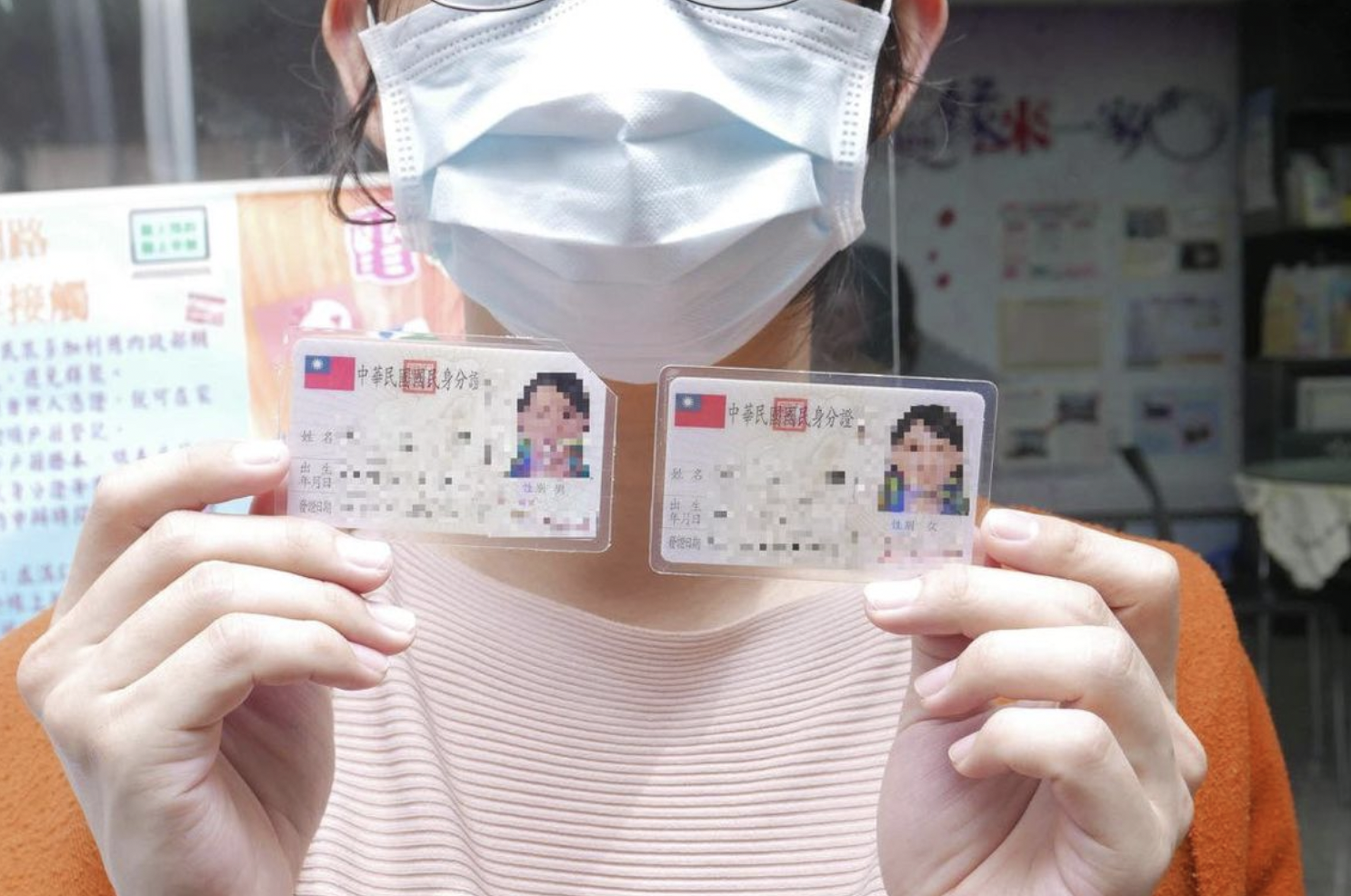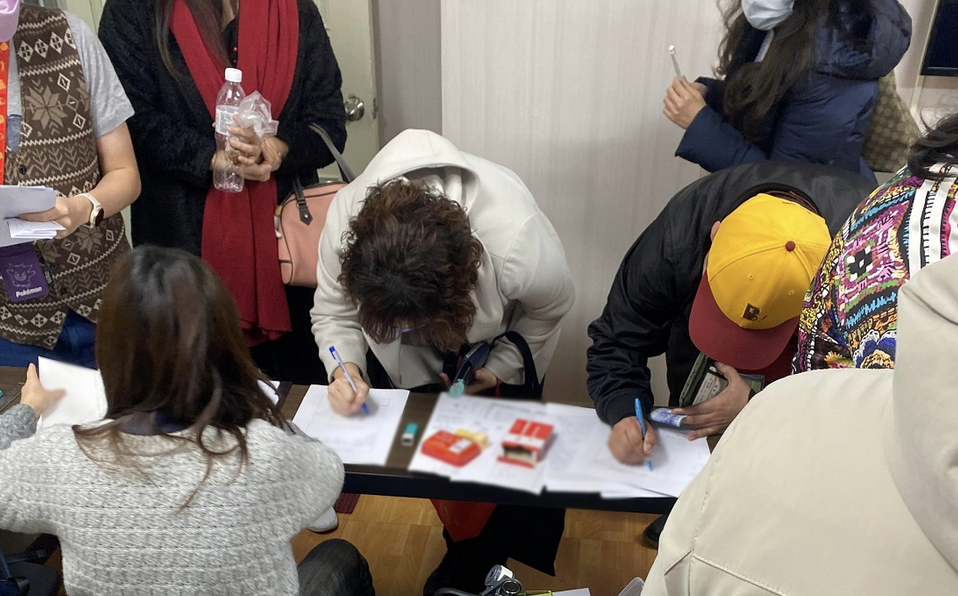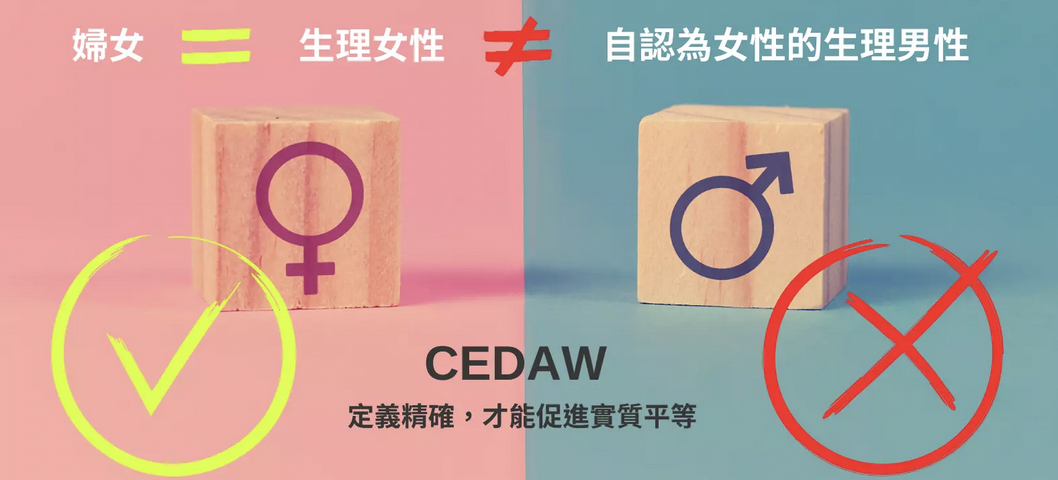
Political activism is relatively new in Taiwan, a country hailed as a beacon of progress in Asia but that only began to approach democracy in the late 1980s and early 1990s. Taiwan transitioned from a one-party state under martial law to a multi-party democracy, and the country began to see democratically elected presidents as recently as 1996. Taiwan has seen a renewed interest in activism and protest of late — the Sunflower Movement, for example, which saw hundreds of student protesters occupy Taiwan’s national legislature in 2014 to oppose a proposed free trade agreement with China, shook up the political culture on the island. Now after almost a year of organizing, Taiwan’s first gender critical, female-centric organization — Taiwan Women’s Association (TWA/Chinese 臺灣女性協會) — is being officially recognized by the government.

Formed through cooperation between grassroots activists in 2022, the TWA is composed of members who seek to promote, ensure, and defend the rights of women and girls using legal argument, policy advocacy, and public education. We are a local, community-based and women and LGB-led organization made up of members of varying ages, academic affiliations, and diverse professional backgrounds, working together to respond to the emerging infiltration of radical gender ideology and female erasure in Taiwan. We are socially progressive members of the community who want to challenge our local media to stop ignoring the need for open debate and unbiased coverage of self-ID laws and gender ideology (which has been thoroughly one-sided to date). We are seeing a modern version of Taiwan’s authoritarian past, similar to the witch trials, except that instead of burning accused “witches,” trans activists and their supporters are vilifying, ostracizing, and blackballing dissenters, and suppressing any information that contradicts their goals.
In Taiwan, International NGOs can set up a nonprofit social organization with the backing of thirty founding members who come from various districts within the country. As a permanent resident of Taiwan, I was able to participate in the formation of the TWA as a founding member and hold a seat on the Supervisory Committee for the next three years. I am the only non-Taiwanese citizen to be a founding member.
Our organization recognizes that this is critically important work done under very difficult circumstances. Part of our budget will go to a 24 hour CCTV and surveillance budget to protect the home of our organization’s director, as there will be a serious risk of violence, harassment, and bullying, on account of the fact the director’s registered address is public and searchable. Because rational questions and critique has been deemed “literal violence” and “life-threatening,” we open the door to violent opposition. As we have seen happen time and time again, those who stand up against gender ideology are fired, blacklisted, threatened with physical harm, rape, or even death — all due to having challenged the idea that the cultural construct of gender should supplant biological sex.
How did this start in Taiwan?
This movement was sparked in part by Feminist Current. My original article remains the only one written in English by someone living in Taiwan addressing what is going on within the country and demonstrating opposition to self-ID legislation. As part of my research, I spoke with activist Neo Yang, an executive board member of TWA, who explained the progression of gender identity ideology in Taiwan and how organizations advising the government were strongly biased in favour of self-ID legislation, helping to translate information I would never have found on my own.
After publishing my first piece on this site in 2021, local Taiwanese women translated my article into Chinese and shared it on popular social media platforms like Plurk. The first article discussed the infiltration of gender identity ideology in Taiwan and how support was growing for related policies and legislation. Citizens opposing self-ID felt a deep sense of betrayal when they tried to raise awareness about this issue, or looked for help within local feminist organizations. One activist I spoke to told me how disappointed she was that so many “Honorable feminist scholars in Taiwan have publicly supported self-ID” and that despite the fact an increasing number of girls and women are concerned about self-ID laws, when they “turned to women’s organizations and politicians for support, they “got nothing but disappointment.”
Connections were made and plans were set into motion to join forces to start an organization that could push back against this harmful ideology. Many in Taiwan were disappointed in the lack of action by feminist organizations here, and such organizations have conformed to “gender mainstreaming” and openly support the inclusion of males in female spaces.
Some founding members of TWA, myself included, also work with an organization called NoSelfID Taiwan (NSIDT). NSIDT is the only website in Taiwan dedicated to pushing back against gender ideology and tracking changes in related legislation. A volunteer for NSIDT told me, “The website is the only one of its kind, and serves as the most comprehensive site on the history, status, and impact of self-ID legislation in Taiwan.” The site hosts dozens of translated articles and news about gender identity ideology from all over the world, providing resources to counteract the mainstream media’s omissions.
Last year, NSIDT started two petitions opposing gender self-identification on Taiwan’s Public Policy Participation Platform, each of which garnered over 5,000 signatures. The first demanded a halt to the alteration of the sex marker on identity cards without proof of sex reassignment surgery, and the other for “clear separation for the safety of women and children.”
What’s on the TWA agenda for 2023?
Like all small nonprofits, TWA’s resources are limited. We have made a strategic decision to focus the vast majority of our time, attention, and financial resources on pushing back against the encroachment of gender ideology. Currently, and historically, there have been many other nonprofit and government-funded organizations in Taiwan that focus on other issues related to women and girls. Many of these organizations are well-funded and receive ample public support, but either support gender ideology, or ignore it entirely — refusing to address it. TWA is the only gender critical, non-partisan, nonprofit that engages in legal arguments and policy advocacy to protect, advance, and defend women’s rights.
Women’s sports in Taiwan are under threat
As I touched on in my second piece for Feminist Current, female sport is at risk of being destroyed in Taiwan. Beginning in 2023, trans-identified student athletes can enter the Taiwan National High School Games — the largest multi-sport event for junior and senior high school players in Taiwan — as the “gender of their choice.” This means that male athletes who “feel” female can compete in the female sport categories. The eligibility rules and competition details have not yet been laid out officially by the National Sports Administration. It only recently come to light that a trans-identified male competed as a woman in Taiwan’s National Intercollegiate Athletic Games in 2018. Many runners and coaches from other schools knew this athlete was male, and representatives of Taiwan’s National Tsinghua University questioned his ability to compete against female athletes in track and field events, but because there were no clear rules for transgender participation in Taiwan, he was able to compete in the female division, destroying the previous record held by a woman.
Convention on the Elimination of All Forms of Discrimination against Women (CEDAW)
To achieve greater equality between the sexes, Taiwan’s highest court, the Legislative Yuan, ratified CEDAW in 2007. Members of TWA have gone through the conclusions and recommendations based upon the review of Taiwan’s “Fourth Report on the Implementation of CEDAW,” published by the Gender Equality Committee of the Executive Yuan (the executive branch of the government) on December 1st, 2022. According to the review, trans-identified men should be included under CEDAW, adding that the government should introduce third-gender certifications to “break gender stereotypes.” The language CEDAW uses has been manipulated and reframed to refer to biological males as part of the distinct sex class of women. The review is littered with the word “gender,” while the actual usage of “sex” is limited to terminologies like “sexual and reproductive health service,” making it very confusing to determine what the focus of their review is. The stated objective of the Convention is the “elimination of all forms of discrimination against women on the basis of sex,” but now includes men in the female sex class. Female erasure is being enacted through changing laws that provide sex-based protections for women, while dismissing biological sex differences as irrelevant or even labeling them bigotry.

Protecting Women-Only Spaces
The protection of women-only spaces and female safety will be at the forefront of our work, as well as working to shine a light on and bring media attention to changes in law and policy in Taiwan that are detrimental to women.
In 2022, administration at National Cheng Kung University tried to sneak a trans-identified male student into female-only dorms. This student possessed all of his functional male genitalia and was meant to share a room with up to five female students in a small space with little privacy. Only after a whistleblower brought this to the attention of the mainstream media did it come under scrutiny. This was not the first time a major Taiwanese university tried bringing a fully intact trans-identified male into girls’ dorms without informing anyone or getting consent. This also happened at Taiwan’s top academic institute, National Taiwan University. In fact, the former Dean of National Taiwan University, Feng Yan, admitted that she “secretly” assisted several trans-identified students to transfer into dormitory rooms of the opposite sex when she served as the Dean of National Taiwan University from August 2005 to July 2012.
As an officially recognized association, TWA can participate in women’s rights related conferences. Rather than merely being “a bunch of concerned citizens” as we have been in the past, we are now a registered INGO. We will be able to send formal complaints to government agencies to pressure them to respond to our inquiries publicly, rather than continuing to hide their agenda from the public. Sending written formal requests for information or further scrutiny will have more impact on local governments, legislators, and the executive branch of government in Taiwan. As a legal entity, we can (but will hopefully never have to) file lawsuits against trans activists who harass or threaten TWA members.
Here in Taiwan, we are taking the advice of Angela Davis, who famously said; “I am no longer accepting the things I cannot change. I am changing the things I cannot accept.”
TWA was created to help promote critical thinking, to open dialogue, and to safeguard the rights of women and girls. While members may not agree on every nuance of this topic, and our personal experiences may differ, we are united in our determination to speak out, educate, raise legitimate concerns, and take action. Within the next month, TWA will be unveiling a new website, in both English and Chinese, and creating a social media presence. TWA will be opening up registration to new members, Taiwanese citizens, and foreigners with permanent resident cards in March.
Like many women around the world have done, we will be fighting back in Taiwan.
Jaclynn Joseph is a Hawai’i born — now Taiwan based — PhD student and university lecturer.
